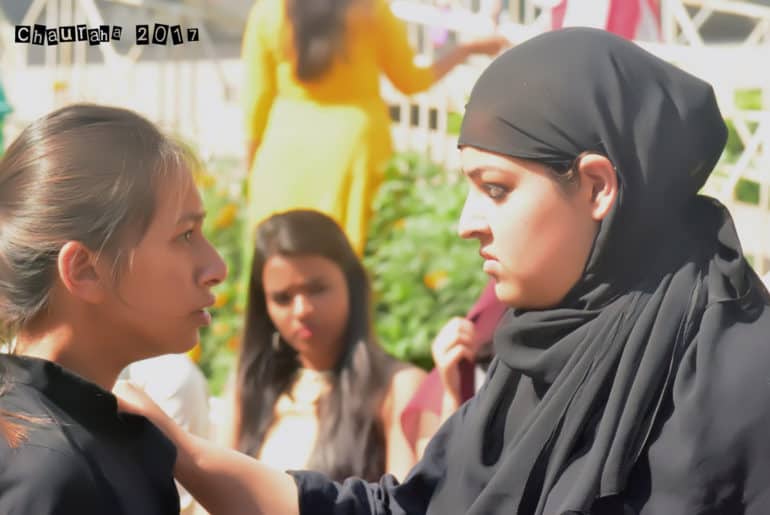On the morning of 9th September, 2016, when the poster ridden walls and broken vodka bottles in Delhi University campus was speaking aloud the Triumph and Failure of the respective student political parties in DUSU’16 Elections, 77 DU Students came out of their rooms, leaving their beds to clean the campus and openly herald their aggression against the corruption, violation of DUSU elections rules, Lyngdoh Committee Recommendations 2012, National Green Tribunal Notice and also the deterioration and exploitation that happens on campus every year in the name of the so-called huge DUSU Elections. It started off as a Facebook group which later garnered support from the National Service Scheme (NSS) of Miranda House, University of Delhi.
That was the opportune moment when the “No Poster Party” as an endeavour, took shape, was created by four students of Miranda House, University of Delhi: Marya Hassan, Swastika Kharbanada, Simran Kapoor and Nancy Sharma. During the 2016 elections, NPP could carry out its cleanliness drive only a day after the election results were declared, starting from Visvavidyalaya Metro Station till Arts Faculty and the peripheral regions of the college.
The months of August and September take a miserable toll on the streets around campuses of the University of Delhi with paper posters littered on every stone and gravel. It becomes a shameful carpet of wastage. NPP’s intentions are to put a stop to this ridiculous manifestation of gross wastage in the name of election campaigning, by ridding the walls of any such posters. Instead, it aims to paint murals and other beautiful paintings reflecting the culture of the University of Delhi, on these walls. But it hasn’t been able to procure official permission from the Proctor and the Registrar of the University of Delhi. Simran Kapoor,a member of the group says, “the irony of how known right-wing political parties choose to vandalise campus walls without permission under the stealthy garb of midnight to evade persecution while none of the authorities bat an eyelash, and how it has proved to be difficult to gain permission for something which only serves the steps of democracy and the protest culture”. “We are not against any political party, we just want our campus to be clean”, remarked Nancy Sharma.
Election season usually witnesses political parties flouting ethics and bribing the students around the campus with lipsticks, pizzas, free movie tickets, cigarettes and a whole lot of other material objects. These practices blatantly violate the Lyngdoh Committee Recommendations 2012 for elections amongst the students in Universities in India and also due to the incessant paper wastage that happens due to campaigning via posters resulting in environmental degradation. NGT’s notice stands to no importance in front of the hooliganism of the political parties. Despite the petition filed by Law Student Nitin Chandran in 2017, there was no improvement in the state of DUSU Elections.
The team then mushroomed with innumerable volunteers and members who share the same cause. The name of the party might sound misleading since essentially NPP doesn’t pledge allegiance to any sort of political leaning. What they believe in is a paperless election campaign and a non-violation of the rules and regulations enshrined within the Lyngdoh Committee Recommendations 2012.
Hassan says, “What’s the point of education if your mess has to be cleaned by an uneducated worker? As a sensible DU student, it’s high time to tell the so called students’ representatives that we want them to be creative and not waste paper in campaigns. We want a fair election.”
NPP’s dedication to the cause of paperless election campaigning is steadfast. So far, in the current months of DUSU election campaigning, it has scraped walls of posters weighing around 20 to 25 kgs. A self-funded party, with financial constraints, it even took to removing the posters with the help of compasses and rulers.
NPP’s clear and staunch efforts are to urge the political parties contesting DUSU elections to turn to alternatives of posters, for campaigning. They could switch to carrying out rallies and engage in social media marketing or using least amount of paper and ensuring it’s recycled after its use. As a result, political parties such as ABVP, switched to using orange flags instead of posters in certain areas.
“Political parties can use other creative methods, to promote themselves. Rallies, conferences, college to college promotions, organising activities like marathons, etc. can be done as a replacement of promotions through thousands of posters”, commented Swastika Kharbanda, one of the founding members of the party.
The party plans to create a Human Chain around campus on the 22nd of August, to rally people in for their cause and raising awareness.
Image Credits: No Poster Party Facebook Page
Ankita Dhar Karmakar
[email protected]










